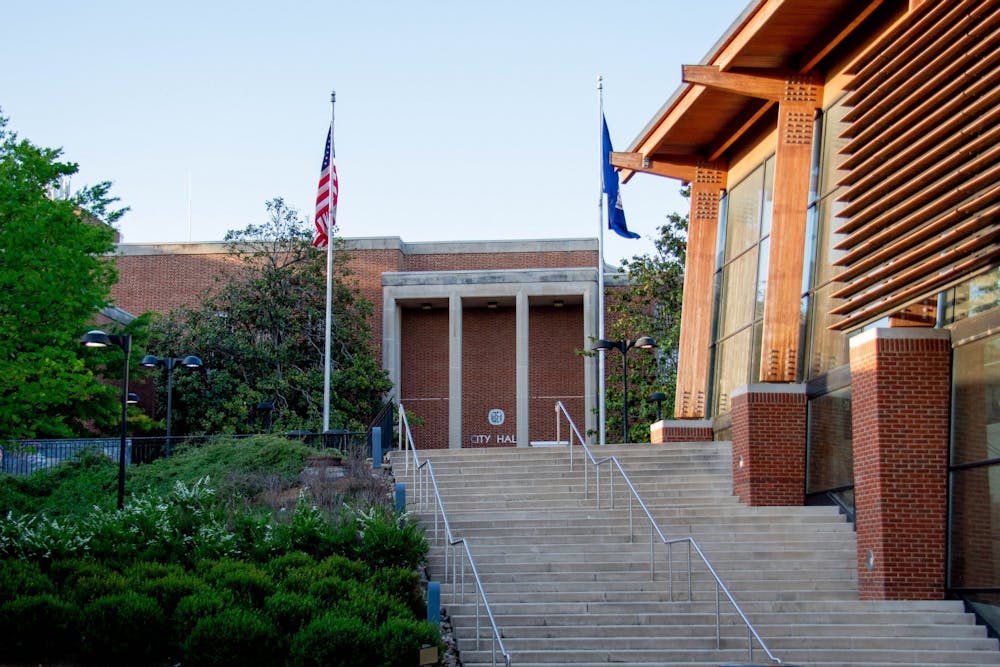Charlottesville City Council met Monday for their second hybrid meeting since 2019. The only item on the agenda for this meeting was consideration of a special-use permit to allow the conversion of an apartment complex on 14th Street into a hotel.
During the public comment portion of the meeting, University lecturer Amanda Nelsen and students from University course Write Climate: Art and Engagement expressed concern about climate change.
The students shared an artistic mural they have spent the past semester making. The mural is made up of postcards and uses color to depict surface temperature anomalies between 1880 and 2022. On the back of each postcard are statements written by community members documenting their feelings about climate change and its impact on Charlottesville.
Third-year College student Johnny Lindberg, one of Nelson’s students, spoke for the class in presenting the piece to Council and called upon Council members to support a strong and comprehensive climate action policy to reduce the City’s carbon footprint.
“Our mural visibly depicts the warming of our climate,” Lindberg said. “On the other side, each postcard, individually sewn together, expresses a community member’s feelings towards the climate crisis … our community members express feelings of anger, fear, anxiety, frustration, and sadness, but above all they express the need for change.”
Council then considered a special use permit request to allow for a hotel on 207 14th Street NW, which is currently the location of a 21-building condominium. The developer hopes to renovate the existing building to create a 19-room hotel and one residential apartment. The proposed change would reduce the number of available rental housing units, but according to the applicant Bill Chapman, the conversion could generate $10,000 per month in tax revenue.
Councilor Sena Magill expressed concern about the proposed special use permit as it could hinder the availability of already scarce housing in the Charlottesville area. Per a 2018 Housing Needs Assessment, 23 percent of Charlottesville renters are spending more than half of their income on rent — the U.S. Department of Housing and Urban Development says that affordable housing should cost no more than 30 percent of the household’s income.
“I can’t in good conscience, while we are looking at such a huge housing crisis, vote to reduce housing stock,” Magill said.
Council voted to deny the special use permit with Councilors Magill, Payne, and Mayor Snook in opposition to the permit and Councillor Pinkston and Vicemayor Wade in support of the permit.
During the reports meeting — which occurs prior to the start of the formal Council meeting and allows Council members to hear updates from community organizations or City staff — the Thomas Jefferson Area Coalition for the Homeless gave a presentation. TJACH is an organization that aims to reduce homelessness through the coordination of regional resources.
TJACH Executive Director Anthony Haro discussed local homelessness, including the Point-In-Time Count which counts the number of individuals in a city experiencing homelessness annually each January. According to Charlottesville’s January count, 228 individuals were living in emergency shelters, an increase from 144 in 2021. Haro voiced his belief that this is due to continued impacts of the COVID-19 pandemic and lack of affordable housing in Charlottesville.
Haro also remarked that the number of unsheltered people — homeless persons living outside — has remained roughly the same since 2010. The PIT count has reported that approximately 20 to 30 people are unsheltered each year, with Haro drawing attention to the city’s failure to address these individuals’ needs.
“What it says is that there is a group of people living outside in our community that we have not significantly been able to address,” Haro said.
In addition to hearing from TJACH, Council heard a presentation from Josh Powell, support services director of the Charlottesville-U.Va.-Albemarle County Emergency Communications Center on how citizens can access emergency services. According to Powell, citizens can access emergency services by calling or texting 9-1-1. Powell additionally noted the development of a new emergency services number — 9-8-8 — staffed with mental health crisis counselors for those dealing with a mental health crisis.
Sonny Saxton, executive director of the Charlottesville-U.Va.-Albemarle County Emergency Communications Center, then provided details on the Marcus Alert system, created to comply with the Marcus David Peters Act which was signed into law by former governor Ralph Northam in Nov. 2020.
According to Saxton, the goal of the Marcus Alert system is to allow emergency services to more easily identify individuals in mental health crises and provide them adequate help while minimizing interactions between law enforcement officers and those in crisis. Under the new procedure, the emergency response to a mental or behavioral health crisis will be analogous to the physical health response – allowing a person in crisis to contact a crisis care team via 9-8-8 or local number and receive aid from a mobile crisis team.
City Council will convene again May 16.







